Advancing Claims for Loss and Damage
Loss and damage, at its heart, is an issue of justice: it demands that climate law and policy redress ongoing and future climate harms and compensate vulnerable communities and countries on the frontlines of the climate crisis. And yet, legal claims addressing loss and damage have been on the margins of both international negotiations and climate litigation – and core questions of compensation and liability remain unaddressed.
In recent years, climate litigation has emerged as an important tool to develop and advance climate law and policy; yet, cases on loss and damage have been few and far between. A survey of thirty climate cases across multiple jurisdictions demonstrates that these cases are largely concentrated in the Global North, while vulnerable countries and communities bearing the disproportionate brunt of loss and damage in the Global South have yet, in general, to file such cases. Most loss and damage cases have been filed in the United States, where states and cities are suing fossil fuel corporations for the costs of the climate crisis. A few cases have been brought by small island states like Antigua and Barbuda, Barbados, Tuvalu, and Vanuatu against other states – though crucially not against corporations, except for the recent Lliuya case in Germany.
This line of work – in collaboration with scientific and community-based partners – aims to fill this gap by strengthening the foundations for loss and damage legal action.

